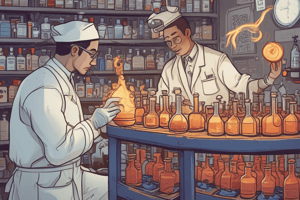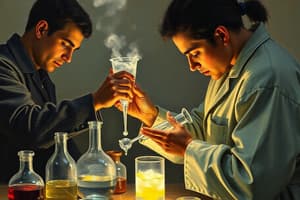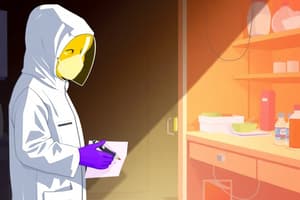Podcast
Questions and Answers
What is the primary purpose of wearing a lab coat in the lab?
What is the primary purpose of wearing a lab coat in the lab?
- To look professional during experiments.
- To avoid contamination from other students.
- To protect against accidents and spills. (correct)
- To keep cool in a heated environment.
What should you ensure about your lab coat while in the lab?
What should you ensure about your lab coat while in the lab?
- It should be closed while you are in the lab. (correct)
- It can be optional as long as you have gloves.
- It must be long and loose fitting.
- It should be heavy and stylish.
Which of the following is NOT a recommended practice for lab safety?
Which of the following is NOT a recommended practice for lab safety?
- Keeping hair tied back.
- Wearing open-toed shoes. (correct)
- Wearing a closed lab coat.
- Using personal protective equipment.
Why is it important to close your lab coat in the laboratory?
Why is it important to close your lab coat in the laboratory?
Which item is essential for protection while conducting experiments in a lab?
Which item is essential for protection while conducting experiments in a lab?
What should you do with solids in a laboratory setting?
What should you do with solids in a laboratory setting?
Which of the following is a directive you should follow in the lab regarding waste management?
Which of the following is a directive you should follow in the lab regarding waste management?
What is one of the responsibilities you must adhere to during lab work?
What is one of the responsibilities you must adhere to during lab work?
What could happen if solids are improperly disposed of in the sink?
What could happen if solids are improperly disposed of in the sink?
Who is responsible for conveying safety and disposal rules in a laboratory?
Who is responsible for conveying safety and disposal rules in a laboratory?
What is crucial to remember when working in a lab?
What is crucial to remember when working in a lab?
Why is it important to know emergency phone numbers?
Why is it important to know emergency phone numbers?
Which of the following is NOT a recommended safety practice in the lab?
Which of the following is NOT a recommended safety practice in the lab?
What should you do if you encounter an emergency in a lab setting?
What should you do if you encounter an emergency in a lab setting?
How should you prepare for potential emergencies in the lab?
How should you prepare for potential emergencies in the lab?
What must you always do after conducting an experiment?
What must you always do after conducting an experiment?
What is a necessary action when handling hazardous or toxic substances?
What is a necessary action when handling hazardous or toxic substances?
Why is it important to wash your hands after an experiment?
Why is it important to wash your hands after an experiment?
Which practice is essential for safety in a lab environment?
Which practice is essential for safety in a lab environment?
What should not be done when dealing with toxic agents?
What should not be done when dealing with toxic agents?
What should you not do with unused chemicals?
What should you not do with unused chemicals?
What is a safe practice when using chemical substances?
What is a safe practice when using chemical substances?
Why should chemicals not be mixed in sink drains?
Why should chemicals not be mixed in sink drains?
Which action is recommended to handle excess chemicals?
Which action is recommended to handle excess chemicals?
How should you handle excess amounts of chemicals during experiments?
How should you handle excess amounts of chemicals during experiments?
What should be ensured regarding electrical equipment before conducting an experiment?
What should be ensured regarding electrical equipment before conducting an experiment?
Who is NOT allowed to work with matches or lighted equipment?
Who is NOT allowed to work with matches or lighted equipment?
What should be done with the equipment if there is a fire drill?
What should be done with the equipment if there is a fire drill?
What is the primary concern when handling matches and lit equipment?
What is the primary concern when handling matches and lit equipment?
Which statement is true regarding the use of Bunsen Burners?
Which statement is true regarding the use of Bunsen Burners?
Flashcards
Lab Coat
Lab Coat
Protective clothing worn in a science lab.
Lab Coat Closure
Lab Coat Closure
Lab coats should be closed while in the lab.
Lab Safety
Lab Safety
Precautions taken in a science lab to prevent accidents.
Lab Clothing
Lab Clothing
Signup and view all the flashcards
Accident Prevention
Accident Prevention
Signup and view all the flashcards
Emergency Phone Numbers
Emergency Phone Numbers
Signup and view all the flashcards
Work Alone in Lab?
Work Alone in Lab?
Signup and view all the flashcards
Solid Waste
Solid Waste
Signup and view all the flashcards
Sink
Sink
Signup and view all the flashcards
Keep Solids Out of the Sink
Keep Solids Out of the Sink
Signup and view all the flashcards
Lab Instructor
Lab Instructor
Signup and view all the flashcards
Housekeeping Rules
Housekeeping Rules
Signup and view all the flashcards
Gloves and Hazardous Materials
Gloves and Hazardous Materials
Signup and view all the flashcards
Post-Experiment Handwashing
Post-Experiment Handwashing
Signup and view all the flashcards
Why Wash After Experiments?
Why Wash After Experiments?
Signup and view all the flashcards
Safety Equipment: Gloves
Safety Equipment: Gloves
Signup and view all the flashcards
Handwashing: Key to Safety
Handwashing: Key to Safety
Signup and view all the flashcards
Unused Chemicals
Unused Chemicals
Signup and view all the flashcards
Original Container
Original Container
Signup and view all the flashcards
Mix Chemicals in Sink Drain?
Mix Chemicals in Sink Drain?
Signup and view all the flashcards
Chemicals in Lab
Chemicals in Lab
Signup and view all the flashcards
Safety Precautions
Safety Precautions
Signup and view all the flashcards
Turn Off Equipment
Turn Off Equipment
Signup and view all the flashcards
Acrylic Nails and Flames
Acrylic Nails and Flames
Signup and view all the flashcards
Why Turn Off Equipment?
Why Turn Off Equipment?
Signup and view all the flashcards
Why No Acrylic Nails?
Why No Acrylic Nails?
Signup and view all the flashcards
Lab Safety: A Priority
Lab Safety: A Priority
Signup and view all the flashcards
Study Notes
Lab Safety
- Personal safety: Protect yourself from injuries and illness
- Classmate safety: Look out for the well-being of others
- Lab safety: Keep the workspace clean, organized and free of accidents, prevent pollution
- Environmental safety: Don't pollute the environment
- Experiment safety: Conduct experiments carefully, ask your instructor if you have any questions
Getting Ready for the Lab
- Dress code:
- Wear a lab coat
- Wear closed-toe shoes, long pants and tied back hair (keep it off your experiment/ flame)
- Wear safety goggles
- May need gloves and hearing protection
- Common Sense: Use good judgment in the lab
- Preparedness: Be ready for your work in the lab
- Quiet Work: Understand the experiment before starting
- Following Instructions: Carefully follow all written and verbal instructions from the instructor
- No Eating/Drinking/Chewing/Smoking: Eating, drinking, chewing, or smoking in the lab is prohibited because materials might be poisonous.
Additional Lab Safety Rules
- Food and Drink: Don't use lab glassware for food or beverages
- Instructor's Absence: Don't work in the lab without your instructor or a representative
- Housekeeping: Follow all housekeeping, safety and disposal rules
- Storage: Use refrigerators, freezers, ovens and storage units only for their intended purpose, don't use them for your personal food or drinks
- Emergency Numbers: Know emergency phone numbers in case of an emergency
- Working Alone: Don't work alone in the lab
- Waste Disposal: Dispose of lab waste properly
- Hazardous Materials: Wear appropriate gloves when using toxic or hazardous agents
- Hand Washing: Wash hands with soap and water after every experiment
- Handling Chemicals: Keep hands away from body, eyes and face when using lab equipment and chemicals
- Chemical Spills: Flush affected areas immediately with running water for 20 minutes and inform instructor
- Sharp Objects: Dispose of broken glass and sharps in the designated container and inform instructor
- Open Flames: Do not use open flames in the lab without permission
Studying That Suits You
Use AI to generate personalized quizzes and flashcards to suit your learning preferences.




